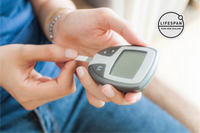
Introducing Dahlia4: Natural Blood Glucose Support
Developed by Otago University, Dahlia4 is a groundbreaking natural supplement for managing blood glucose levels. Combining the best of nature and science, it offers a safe and effective way to support your health.
Why Dahlia4?
Natural Ingredients: Carefully selected for their synergistic effects on blood glucose.
Scientifically Proven: Rigorously tested for efficacy and safety.
Holistic Health: Aids in overall well-being when used alongside a balanced diet and exercise.
Dahlia4 is more than a supplement; it's a step towards a healthier, more balanced life. Experience the natural way to manage your blood glucose with Dahlia4.
Recent posts

About the Author
Lifespan NZ, bolstered by over 60 years of experience, features a team of experts including Ben Winters, a key member and the author of our insightful blogs. Specialising in refining extracts from a diverse range of natural sources and well-versed in farming practices, our team's expertise was a pivotal reason why Otago University chose Lifespan NZ to develop a unique, research-backed blood sugar supplement, into an end product.

10 Ways to Maintain Healthy Blood Glucose Levels
By Ben Winters
In an era where more individuals are grappling with weight-related issues than ever before, managing blood glucose, or blood sugar, has emerged as a vital aspect of maintaining good health.
As our healthcare systems become increasingly under-resourced, the responsibility of sustaining one's health often falls on individuals, underscoring the need for accessible, self-directed health management strategies.
This reality doesn't merely affect those battling illnesses; it impacts anyone striving for a long, fulfilling life, as optimal health is inextricably linked to quality of life.
The control over our well-being, although daunting, is a powerful asset in navigating the current landscape of health and healthcare
Understanding and managing one's blood sugar levels plays a significant role in this personal journey, particularly given its influence on various health conditions, including diabetes and obesity, which are substantial contributors to global health concerns.
By taking control of their own good health, through informed, health-conscious decisions, individuals can significantly improve their life quality, mitigate health risks, and alleviate the growing strain on healthcare systems.

This comprehensive guide is designed to empower you with 10 practical strategies for maintaining healthy blood glucose levels, an essential step on the path to better health and a more vibrant life.
1. Avoid Highly Processed Foods: In the quest to maintain healthy blood glucose levels, one of the first steps involves reevaluating our dietary choices, particularly steering clear of highly processed foods.
These products are not only deficient in essential nutrients but also often loaded with added sugars and unhealthy fats that can spike blood sugar.
They contribute to weight gain and obesity, putting additional strain on bodily systems and, consequently, on public health resources.
2. Choose Better Carbs: Carbohydrates are a necessary part of our diet, providing vital energy.
However, selecting better, complex carbohydrates is crucial in controlling blood sugar levels, as they are digested slowly and cause a more gradual rise in glucose.
Refined carbohydrates, on the other hand, can lead to rapid blood sugar spikes and increased strain on the body's ability to manage glucose effectively.
Incorporating healthier carbs like whole grains, legumes, fruits, and vegetables not only stabilises blood sugar but also ensures a nutrient-rich diet. It promotes satiety, and aids in weight management.
3. Eat More Protein: Protein plays a pivotal role in a balanced diet, especially in its capacity to moderate blood sugar levels.
Consuming sufficient protein helps slow down the digestion of carbohydrates, preventing sudden spikes in blood glucose. Protein supports muscle mass, crucial for a robust metabolism and effective in the prevention of weight-related health issues.
Balancing one's intake of lean protein, from sources such as poultry, fish, legumes, and nuts, is a proactive approach to nourishing the body, sustaining energy levels, and managing blood sugar, leading to a better quality of life.
4. Eat More Fibre: Fibre is a crucial nutrient for blood sugar management.
High-fibre foods slow carbohydrate digestion and absorption, resulting in a more gradual rise in blood sugar levels.
Beyond this, fibre promotes digestive health, aids in achieving a healthy weight, and is protective against various chronic diseases, all factors that contribute to a healthier population and, by extension, less strained healthcare resources.
An easy way to add more fibre into one’s diet is to eat more fruits, vegetables, whole grains, and legumes.
5. Balance Macros in Each Meal: Managing macronutrients — carbohydrates, proteins, and fats — in each meal is a strategy everyone can adopt for stable blood sugar levels.
This balance is crucial in preventing glucose levels from soaring or dropping and in supporting sustained energy levels throughout the day. A well-rounded meal contributes to overall nutrient intake, supporting various bodily functions and health.
6. Portion Size: Controlling portion sizes is an effective, immediate action that assists in managing calorie intake, promoting weight loss or maintenance, and regulating blood sugar levels.
Large portions can lead to overeating and weight gain.
7. Regular Meals: Eating at regular intervals is a preventive strategy to avoid dramatic blood sugar spikes and crashes.
Skipping meals or irregular eating patterns can destabilise blood sugar levels, potentially leading to unhealthy snacking or overeating at the next meal. Both scenarios can contribute to weight and health issues.
8. Stay Hydrated: Hydration is a key yet often overlooked element in maintaining balanced blood sugar levels.
Drinking adequate water throughout the day helps the kidneys flush out excess glucose through urine.
Furthermore, proper hydration supports overall metabolic functions, critical for the body's ability to balance blood sugar effectively.
9. Good Quality Sleep: Quality sleep is foundational for overall health, including the body's management of blood sugar levels.
Inadequate sleep can disrupt crucial hormones, leading to increased appetite, weight gain, and elevated blood glucose, all of which strain personal health and, by extension, healthcare resources.
Ensuring a good night's sleep, involves establishing a regular sleep schedule, aiming to go to bed and wake up at consistent times, which helps regulate the body's internal clock.
It is also helpful to create a restful environment by reducing noise levels, limit exposure to bright screens from devices like smartphones or computers before bed, and make sure your sleeping space is dark, quiet, and cool.
10. Exercise: Exercise is a powerful tool in the regulation of blood glucose levels, and because of this, exercise should always be part of our daily routine.
When we engage in physical activity, our bodies consume energy, utilising available glucose in the bloodstream.
This process is particularly crucial for individuals looking to manage their blood sugar levels, as it helps reduce the glucose that can accumulate in the blood.
Furthermore, exercise increases insulin sensitivity, meaning our cells are better able to use available insulin to absorb sugar during and post-activity, a long-term benefit that extends well beyond the period of exercise itself.
The advantages of incorporating a mix of aerobic exercises, like walking, running, or swimming, and anaerobic exercises, such as weightlifting or sprinting, are manifold.
This diversity not only aids in keeping workouts engaging and enjoyable but also ensures comprehensive health benefits, ranging from improved cardiovascular health to enhanced muscle strength, all contributing to more effective blood glucose management.
It's recommended that individuals consult with healthcare professionals to tailor exercise routines that suit their specific needs, thereby maximizing benefits and ensuring safety.
Ultimately, regular physical activity emerges not just as a means for immediate blood glucose control but as a catalyst for sustained, holistic health.
Navigating the path to maintaining healthy blood glucose levels begins with an understanding and appreciation of food as our ally.
In a world increasingly cluttered with highly processed foods, which often lead to erratic blood sugar spikes, our first step toward health clarity comes from a return to real, whole foods.
This approach isn't about deprivation but rather a reorientation towards the abundance found in nature's pantry.
It's here, in the colorful variety of fruits, vegetables, whole grains, and legumes, that we find a richness of nutrients, fibers, and yes, even carbohydrates, that work in harmony with our bodies.
Embracing real foods opens the door to a more nuanced relationship with macronutrients, where carbohydrates, fats, and proteins are not feared but rather understood and balanced.
Healthy carbohydrates, including those found in whole grains and produce, provide the energy our bodies need, all while promoting stable blood glucose levels.
Meanwhile, incorporating healthy fats and lean proteins into our diet ensures a feeling of satiety, aids in the absorption of vital nutrients, and contributes to a well-functioning metabolism.
This synergy between the macronutrients plays a crucial role in sustained energy levels, appetite regulation, and overall health.
The goal, ultimately, is to create an environment where our bodies can function optimally. By minimising our intake of highly processed foods, known for their adverse effects on blood sugar, and championing a diet rich in a variety of real foods, we lay a strong foundation for stable blood glucose levels.
This dietary strategy represents a proactive, empowering approach to health. It underscores the concept that through conscious eating, we're not just avoiding health pitfalls; we're actively charting a course for vitality and longevity.
Empowering ourselves to take charge of our blood glucose levels and, by extension, our overall well-being, is both an inspiring and attainable goal.
Amidst concerns over health and lifestyle diseases, it's uplifting to realise that each of us holds the key to significant aspects of our health.
By embracing simple yet powerful lifestyle adjustments, we can chart a course toward not only healthier blood sugar levels but also a more vibrant, energetic life.
Each person, regardless of their circumstances, can use the above 10 principles, and adapt them to fit their unique lives.
Whether it's choosing a piece of fruit over a sugary snack, going to bed a little earlier, or savoring the simple pleasure of a brisk walk, these are small but mighty triumphs in our health journey.
Conclusively, managing our blood glucose and embracing a healthier lifestyle is less about stringent measures and more about celebrating a series of rewarding choices.
Every positive step is a victory, an act of self-care that ripples into a wider pool of personal well-being and joy.





